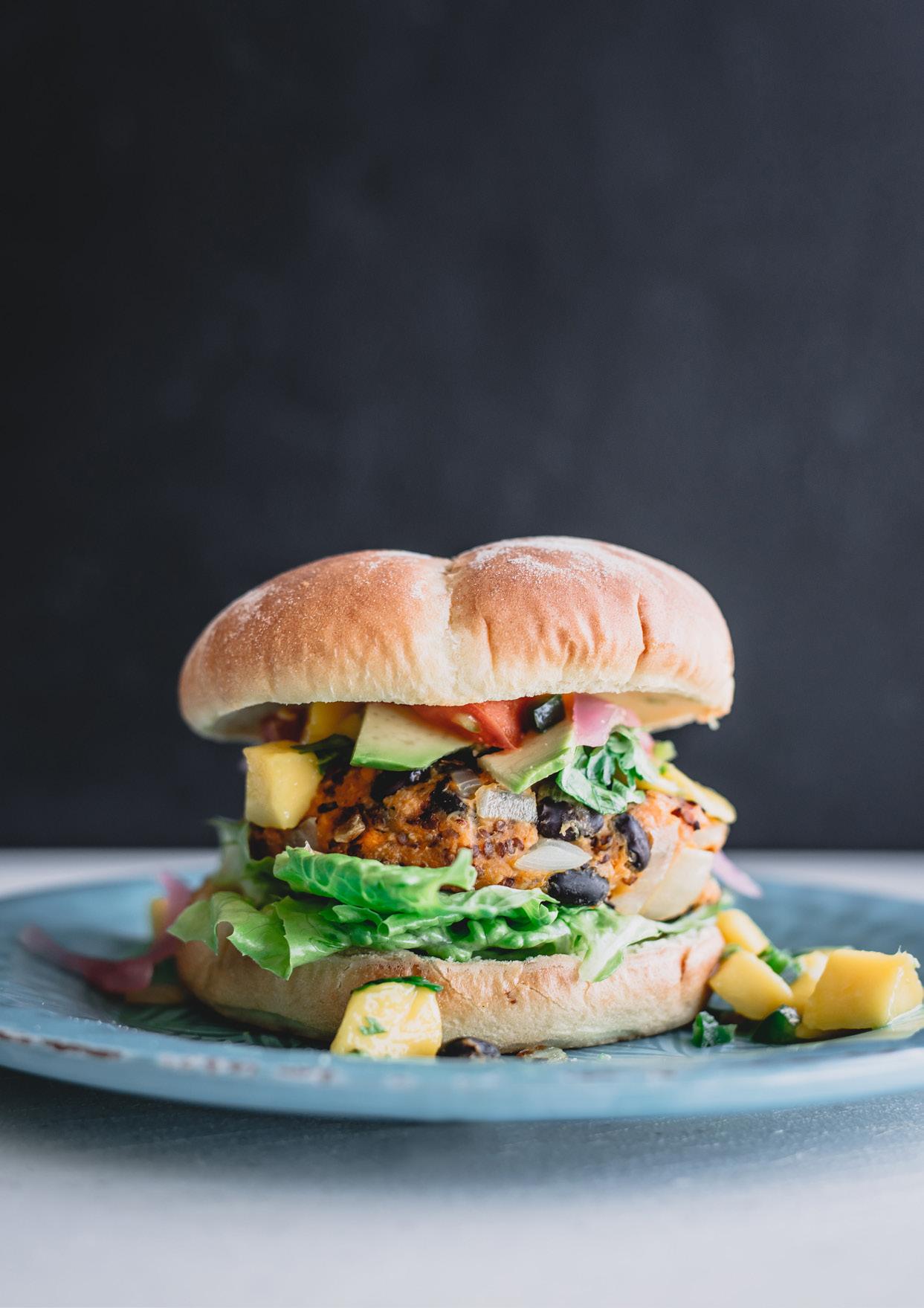
7 minute read
The Rise and Rise of Plant Based Foods
a 21st century culinary revolution
ENTER ANY RESTAURANT, CHAIN PUB OR FAST FOOD OUTLET TODAY AND YOU WILL LIKELY BE GREETED BY A MENU THAT FEATURES
AT LEAST ONE OR TWO PLANT-BASED FOOD OPTIONS, with many offering a fully plant-based alternative without even raising an eyebrow.
From Greggs’ famed Vegan Sausage Roll, to Burger King’s Impossible Whopper the options for those who choose not to eat animal products are growing at an exponential rate.
Even our supermarket shelves are groaning under the weight of new plant-based products from big name brands (think meat-free Richmond sausages and veggie burgers from Birds Eye), which is no surprise considering the rapidly expanding market for animal-free food alternatives.
Just a generation ago, plant-based eaters found themselves on the fringes of culinary society, excluded from dinner party invites and forced out of food-centric celebrations by a lack of understanding of, or provision for, their dietary choices.
But fast forward to 2020 and the days of toting a Tupperware full of self-made food to every eating event are a thing of the past for plantbased consumers. So what has changed? And why?
POST-MILLENNIAL MENUS
Where veganism was once the preserve of ethical eaters, the years since the turn of the millennium have seen a massive explosion of plant-based eating styles – making the mass production of plant-based alternatives a viable option for mainstream manufacturers in the 21st Century.
Younger consumers appear to be more flexible in their approach to eating and are throwing the ‘meat-and-two-veg’ shackles from their meals in favour of a more experimental approach that espouses a selection of positive-eating principles.
WHO IS EATING PLANT-BASED PRODUCTS?
While it may be common to refer to consumers who choose not to eat animal derivatives as vegans, in many cases this is a misnomer. Veganism is not a diet, but a lifestyle that eschews the exploitation of animals for human gain. Ethical vegans, as they style themselves, avoid any product or process that involves the killing or controlling of animals.
Self-declared vegans number around 600,000 in the UK today, according to The Vegan Society of Great Britain — a fourfold increase on the figure of five years ago — but just over one percent of the population isn’t enough to explain the explosion in plant-based edible products — so who else is eating these options?
WELCOME TO THE WORLD OF THE FLEXITARIANS
A thoroughly modern phenomenon, Flexitarians choose not to constrain themselves to a single eating style, opting instead to enjoy each meal on its own merits, while being conscious of the wide range of issues surrounding food production and consumption.
HEALTHY FOCUS PROMOTES PLANT-BASED CHOICES
Health advice in recent years has emphasised the potential pitfalls of both red meats and processed animal products, advising reductions in consumption of both, a call that has been heeded by the Flexitarian generation with the enthusiastic adoption of concepts such as the self-explanatory “Meat-free Mondays” and the growing Veganuary trend.
Veganuary challenges both carnivores and existing vegetarians to sample the world of plant-based eating in January. Well-timed to coincide with the post-holiday guilt trips of the New Year, the initiative has seen its participation rise to almost a quarter of a million over just five years, helping some to discover a new way of everyday eating, and introducing others to interesting new meat and dairy free alternatives which they can go on to incorporate in their daily diets.
NUTRITIONISTS AND CAMPAIGNERS ARE SOCIAL MEDIA SAVVY
Veganuary is just one of a number of plant-based initiatives that has trended online in recent years. Others include the #cleaneating explosion of the last decade, which saw Instagram influencers such as Deliciously Ella and Freelee the Banana Girl, propelled to superstardom on the back of their plant-based food photos.
Over on Facebook, groups such as What Fat Vegans Eat attract tens of thousands of members to share recipes and product tips alongside mouthwatering images of meat- and dairyfree meals, while savvy Twitter users know that sharing #veganfortheanimals and #crueltyfree products is a sure way to engage a new audience.
PLANT-BASED PRODUCTS AND ETHICAL EATING
While not everyone who eats meat- and dairy-free options is a cardcarrying vegan, there is no denying that the ethical element of these aliments is a consideration for both consumers and marketers. Graphic vegan viral content such as the Joaquin Phoenix narrated documentary “Earthlings” have opened many eyes to the ethical questions surrounding animal products, while popular documentaries such as “Forks over Knives” have turned the spotlight on potential links between animal product consumption and health issues in the general population.
WHAT DOES PLANT-BASED EATING LOOK LIKE IN 2020?
With so many influencing factors at play across the varying spheres of modern life the plant-based community is growing larger and more influential, resulting in an explosion of options for diners who prefer mock meat and want to ditch the dairy.
While clean eating and wholefoods play a huge role in the market, plant-based alternatives are proving more and more popular as newly minted vegan-eaters attempt to navigate their diet without feeling like they are missing out on favourite foods.

21ST CENTURY CONSUMERS ARE DITCHING THE DAIRY
Plant based milks are now the pour of choice for around a quarter of Britons, with one 2018 survey putting the market share for this range of dairy-free products that includes soy, coconut and oat milks, at an impressive 23%.
And did you realise that choosing to eat a plant-based diet does not mean you have to give up cheese? There is a booming trade in plant based cheese products with options created using everything from soy beans and sunflower seed to cashew nuts and tapioca! Animal product avoiders can choose from a range of grab and go supermarket-shelf stock cheeses, or opt for something special from the growing army of plant-based artisans creating exciting dairy-free alternatives.
Family favourite chain restaurants such as Pizza Express and Ask Italian even offer fully vegan pizzas topped with their chosen vegan mozzarella brands, ensuring even families with a selection of eating styles can enjoy an easy dining out experience — something that would have been hard come by just a decade ago!
BUT IS MEAT MURDER? Of course, the shift towards A GUIDE TO MODERN DAY DIETS plant-based eating is a controversial one in some VEGAN: Vegans choose not to use any product that exploits animals, and circles, with concerns for the as a result do not eat any animal derivatives, including meat, dairy, eggs, future of traditional farming gelatine or honey. and the lives (and indeed PLANT BASED: Strict plant based eaters follow the same dietary principles ways of life) that depend on as ethical vegans, but may use animal products in other areas of their lives. the established pastoral norms. VEGETARIAN: Vegetarians choose not to eat meat or fish but will eat
With meat being taken off eggs and dairy many menus livestock farmers PESCATARIAN: Pescatarians do not eat meat but will eat fish, eggs and have understandably raised dairy. concerns over the demonisation FLEXITARIAN: Flexitarians do not ban any food groups from their diets, of their businesses, which but will happily eat fully plant based options as part of their regular diet have also come under attack as well as including meat and dairy options in a healthy balance. from environmental angles with campaigners attempting to lay blame at their door for everything from climate change to water shortages.
Celebrity chefs have leant weight to the movement with campaigns for more ethical meat consumption, which endorse the consumption of organic and free-range options, often at a higher price point, which encourages the consumer to opt out of a system that demands meat at every meal, fuelling demand for plant-based products.
IS THE FUTURE FLEXITARIAN?
While trends in everything, eating included, often ebb and flow, the growing prevalence of plant-based products seems to be indicative of a seismic shift in our approach to everyday nutrition.
Many, when questioned, are open to trying or are already eating these options. Local education authorities in many areas are offering plantbased options without the need to order in advance, as was once the case, and a new generation of Flexitarian eaters will soon be the walletwielding decision makers in the supermarket aisles.
It remains to be seen if we (and the planet) will be healthier and happier as a result of this newfound eating equilibrium.





